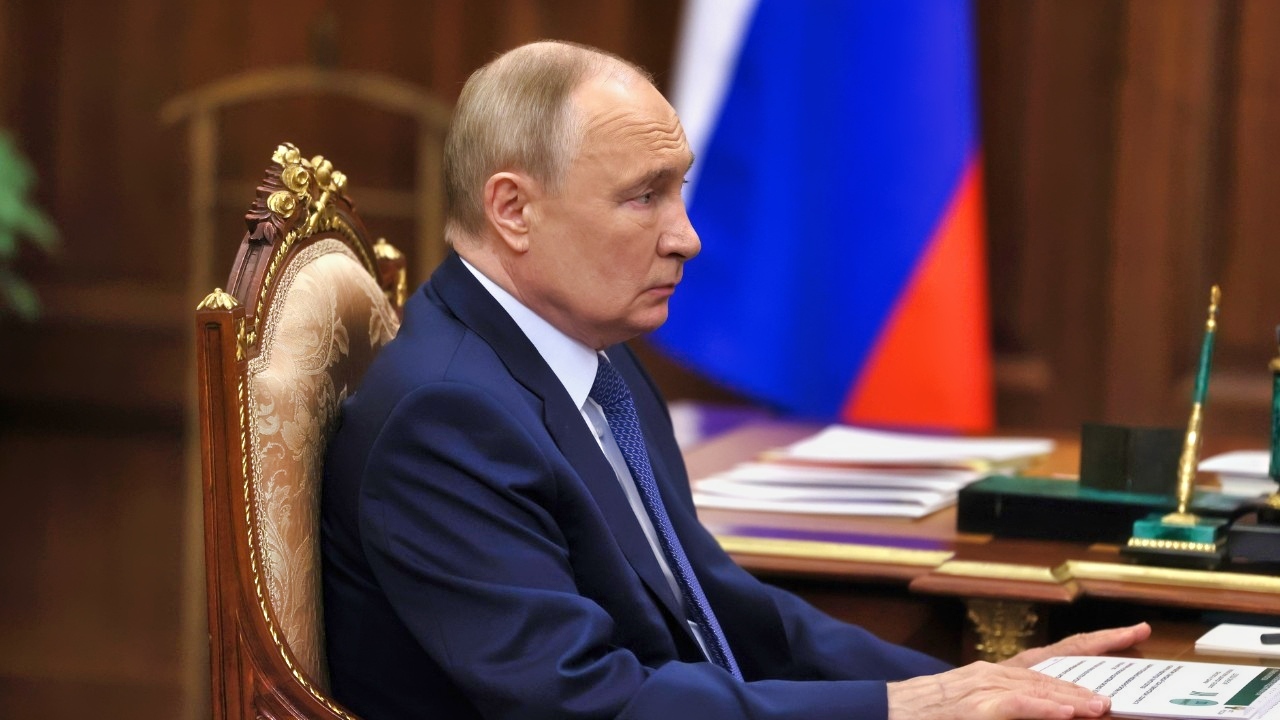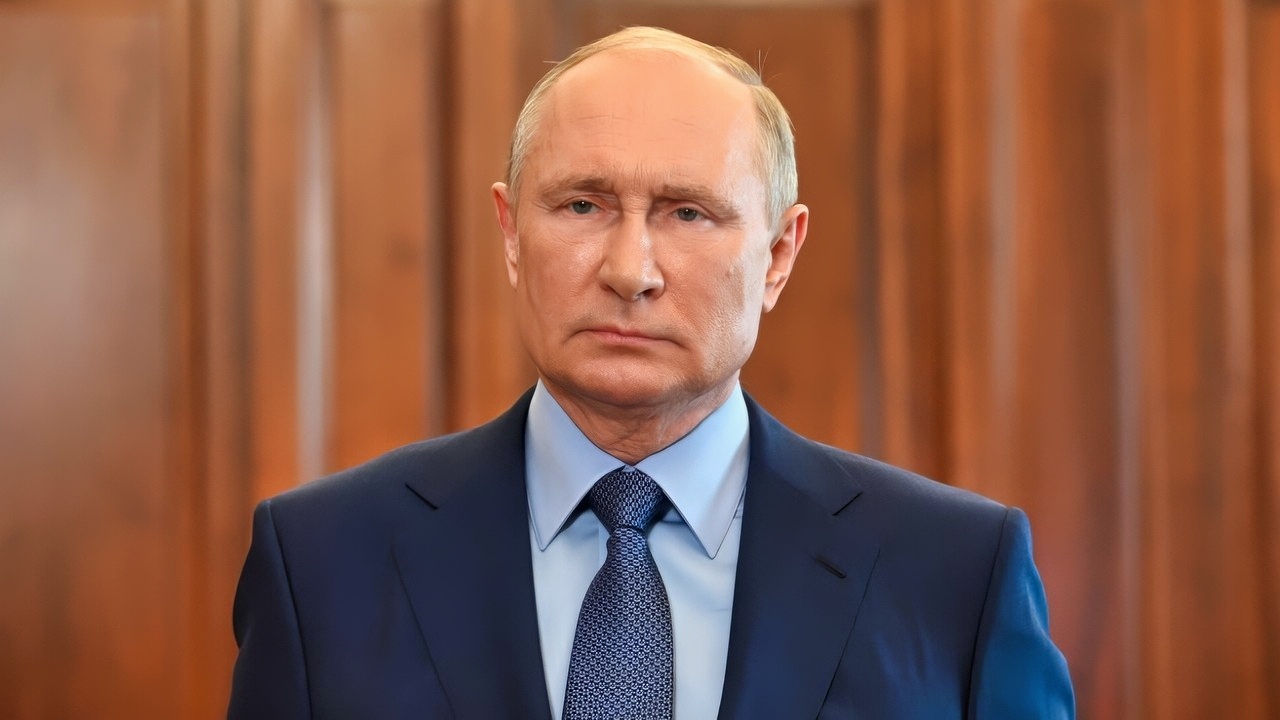Key Points and Summary – A viral video from St. Petersburg shows hundreds of Russians publicly singing a forbidden anti-war song in a rare and risky act of defiance in Vladimir Putin’s hometown.
-The song, “Cooperative Swan Lake,” references the Soviet-era practice of broadcasting the ballet “Swan Lake” on state TV to signal the death of a leader, a clear expression of hope for the regime’s end.

Putin in 2022. Image Credit: Creative Commons.
-This unprecedented protest, coupled with growing domestic disillusionment over issues like fuel shortages, suggests Putin’s seemingly ironclad rule may be more “brittle” and at greater risk of sudden collapse than previously thought.
Is Putin’s ‘Brittle Regime’ Finally Starting to Crack?
WARSAW, POLAND – St. Petersburg, Russia, is the second city of Russia after Moscow and also the hometown of President Vladimir Putin.
In Soviet times, it was referred to in official propaganda as the “cradle of the revolution,” the city where the Great October Socialist Revolution took place, which brought the Bolshevik party to power.
Recent events suggest the city might be living up to that nickname in the present day.
On Tuesday night, a crowd of people gathering in the city’s center sang a forbidden anti-war song recorded by a Russian musician previously denounced as a “foreign agent.”
A video of the event has since gone viral.
The video clips that were circulated on the Telegram messaging application showed the group gathered in a public square singing the song “Cooperative Swan Lake” written by Noize MC.
The song’s lyrics condemn the Russian state authorities, the nation’s population’s silence and general passivity about the war in Ukraine, and the Kremlin propagandists that are constantly justifying President Vladimir Putin’s aggression.
Later, it was reported that the person who had been the ringleader of this impromptu sing-along had been arrested.
Ultra-nationalist, pro-Putin Russians were also reported to have expressed anger at the video.
Beginning of a Backlash Against Putin
Since Putin’s full-on invasion of Ukraine in February 2022, Russian state authorities have implemented an increasingly repressive set of laws on freedom of expression.
These laws have been particularly brutally enforced against any public demonstrations that promote public opposition to the war and Putin’s government.
The fact that a group of people were “willing to take the not inconsiderable risk to assemble in such a very public manner and then sing a recorded by a prominent anti-government artist – and to do so in Putin’s home city – shows just how much anger and dissent there is boiling beneath the surface in the present day,” said an anti-Putin politician and opposition leader living in exile in the US.

Putin in October 2024 Kremlin. Image Credit: Russian Government.

Putin on Direct Line Back in 2019. Image Credit: Creative Commons.
Dissent on this level against Putin’s state apparatus is not only unusual but unprecedented as well, due to the suffocating secret police apparatus.
But despite the repressive authorities trying their best to intimidate the population, the situation on the home front, particularly with fuel shortages brought about by attacks on Russia’s oil industry, is creating a new level of disillusionment about the former KGB Lt. Col.’s regime.
Footage of this incident clearly shows people gathered in St. Petersburg singing the song recorded by Noize MC, the stage name of Ivan Alekseev, 40.
The middle-aged activist is a Russian musician whose compositions condemn the rampant corruption and police brutality in Russia.
Because of his critical views of the Russian government and the many atrocities committed in Ukraine, Alekseev has been subjected to concert cancellations, censorship, and surveillance at the hands of the Russian government.
He has been labeled a “foreign agent” by the Kremlin and was subsequently forced to relocate to Lithuania, where he has continued to support anti-war causes and has also held benefit concerts for Ukrainians.
Protest Movements
The nighttime footage taken in the center of St. Petersburg showed hundreds of people singing “Cooperative Swan Lake.”
The song was released by Alekseev in 2022 after the start of the war.
Its lyrics are directed at Kremlin TV propagandists who justify the war, and it contains such lines as “I want to talk to you, but the TV is blaring, it’s pretending to be your head, its speaker is like your mouth.”
In another section of the song, the lyrics are, “I want to watch the ballet, let the swans dance.”
This is in reference to the fact that the deaths in 1982, 1984, and 1985 of Soviet leaders Leonid Brezhnev, Yuri Andropov, and Konstantin Chernenko always caused regularly scheduled TV programming to be preempted by the famous Tchaikovsky ballet Swan Lake.
These are one of the many references to this ballet seen on social media, sometimes in handbills posted on lamp posts.
“The obvious message here is ‘we can’t wait for Swan Lake to be broadcast again first thing in the morning, because it will mean this ******* Putin is dead,” said the same anti-Putin politician.
Swan Lake was also performed on television in August 1991, during massive demonstrations that marked the beginning of the fall of the Soviet Union. To those who are fed up with Putin’s rule, it “would be like the signal that the end of this KGB dictatorship is almost over,” he said.

Putin Back in June 2021. Image Credit: Creative Commons.
“Get rid of Solovyov from the screen, let the swans dance,” is how the song ends.
This is in reference to Vladimir Solovyov, an official program host on the Russia 1 TV channel who is an ardent Kremlin propagandist and one of the more hated Putin allies.
Writing last year in Foreign Affairs, the pre-eminent historian of modern Russia, Stephen Kotkin, observed:
“Putin’s regime, a highly personalized system run by an aging autocrat, is more brittle than it seems. Driven by Putin’s whims and delusions, Moscow is liable to commit self-defeating blunders. The Russian state effectively implements orders from the top, but it has no control over the quality of those orders. For that reason, it is at permanent risk of crumbling overnight, as its Soviet predecessor did three decades ago.”
If the sentiments expressed this week in St. Petersburg are any indicator, the “crumbling overnight” might not be far off.
About the Author: Reuben F. Johnson
Reuben F. Johnson has thirty-six years of experience analyzing and reporting on foreign weapons systems, defense technologies, and international arms export policy. Johnson is the Director of the Asia Research Centre at the Casimir Pulaski Foundation. He is also a survivor of the Russian invasion of Ukraine in February 2022. He worked for years in the American defense industry as a foreign technology analyst and later as a consultant for the U.S. Department of Defense, the Departments of the Navy and Air Force, and the governments of the United Kingdom and Australia. In 2022-2023, he won two awards in a row for his defense reporting. He holds a bachelor’s degree from DePauw University and a master’s degree from Miami University in Ohio, specializing in Soviet and Russian studies. He lives in Warsaw.
More Military
Russia’s T-14 Armata Super Tank Mistake Still Stings
SR-72 Darkstar: The Mach 6 Mothership for the F-35 and F-47
China’s J-20 Mighty Dragon Fighter Can Be Summed Up In Just 4 Simple Words
The MBT-70 Tank Still Haunts the U.S. Army
Russia’s ‘New’ MiG-35 Fighter Is Officially ‘Circling the Drain’










